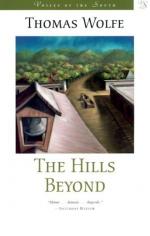|
This section contains 4,146 words (approx. 14 pages at 300 words per page) |

|
SOURCE: "The Ebb and Flow of Time and Place in 'The Lost Boy'," in Southern Studies, Vol. XIX, No. 4, Winter, 1980, pp. 400-08.
In the following essay, Adams evaluates the coming and going pattern of memory, time, and location in Wolfe's story "The Lost Boy."
Thomas Wolfe's famous phrase, "You can't go home again," was often repeated at his seventy-fifth birthday celebration in Asheville in October of 1975. Although this phrase was usually associated with Wolfe's difficulties with his home town after he published Look Homeward, Angel, it could have also applied to his other childhood home in St. Louis, Missouri, where he lived for six months in 1904 and where he returned in September 1935 to visit the actual house where he had lived during the World's Fair of 1904. Wolfe's return to St. Louis, like his first visit to Asheville following Look Homeward, Angel's publication, became a literary work, "The Lost...
|
This section contains 4,146 words (approx. 14 pages at 300 words per page) |

|


